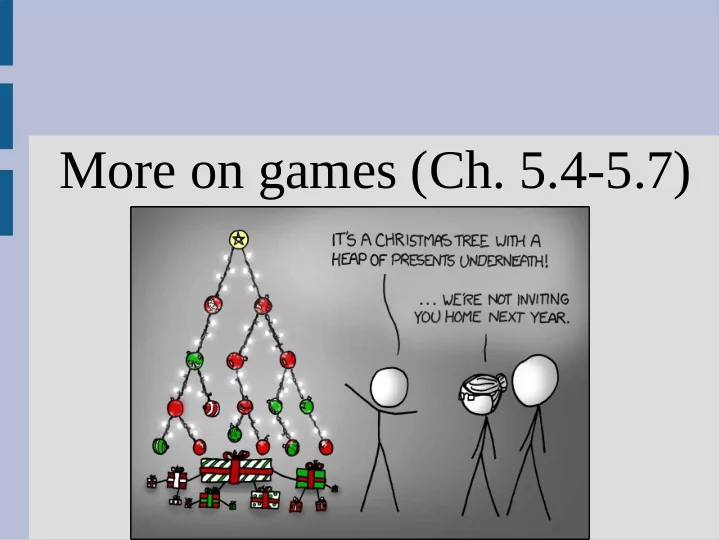

More on games (Ch. 5.4-5.7)
Announcements Midterm will be on “gradescope” (will get an email from them... signup optional) Writing 2 posted Writing 1 regrades – until 10/25
Random games If we are playing a “game of chance”, we can add chance nodes to the search tree Instead of either player picking max/min, it takes the expected value of its children This expected value is then passed up to the parent node which can choose to min/max this chance (or not)
Random games Here is a simple slot machine example: don't pull pull 0 chance node -1 100 V(chance) =
Random games You might need to modify your mid-state evaluation if you add chance nodes Minimax just cares about the largest/smallest, but expected value is an implicit average: .9 .9 .9 .9 .1 .1 .1 .1 1 4 2 2 1 40 2 2 R is better L is better
Random games Some partially observable games (i.e. card games) can be searched with chance nodes As there is a high degree of chance, often it is better to just assume full observability (i.e. you know the order of cards in the deck) Then find which actions perform best over all possible chance outcomes (i.e. all possible deck orderings)
Random games For example in blackjack, you can see what cards have been played and a few of the current cards in play You then compute all possible decks that could lead to the cards in play (and used cards) Then find the value of all actions (hit or stand) averaged over all decks (assumed equal chance of possible decks happening)
Random games If there are too many possibilities for all the chance outcomes to “average them all”, you can sample This means you can search the chance-tree and just randomly select outcomes (based on probabilities) for each chance node If you have a large number of samples, this should converge to the average
MCTS How to find which actions are “good”? The “Upper Confidence Bound applied to Trees” UCT is commonly used: This ensures a trade off between checking branches you haven't explored much and exploring hopeful branches ( https://www.youtube.com/watch?v=Fbs4lnGLS8M )
MCTS ? ? ?
MCTS 0/0 0/0 0/0 0/0
MCTS 0/0 0/0 0/0 0/0 child Parent
MCTS 0/0 UCB value ∞ ∞ ∞ 0/0 0/0 0/0 Pick max (I'll pick left-most)
MCTS 0/0 ∞ ∞ ∞ 0/0 0/0 0/0 (random playout) lose
MCTS 0/1 ∞ ∞ ∞ 0/1 0/0 0/0 update (all the way to root) (random playout) lose
MCTS 0/1 0 ∞ ∞ 0/1 0/0 0/0 update UCB values (all nodes)
MCTS select max UCB 0/1 & rollout 0 ∞ ∞ 0/1 0/0 0/0 win
MCTS update statistics 1/2 0 ∞ ∞ 0/1 1/1 0/0 win
MCTS update UCB vals 1/2 1.1 2.1 ∞ 0/1 1/1 0/0
MCTS select max UCB 1/2 & rollout 1.1 2.1 ∞ 0/1 1/1 0/0 lose
MCTS update statistics 1/3 1.1 2.1 ∞ 0/1 1/1 0/1 lose
MCTS update UCB vals 1/3 1.4 2.5 1.4 0/1 1/1 0/1
MCTS select max UCB 1/3 1.4 2.5 1.4 0/1 1/1 0/1 ∞ ∞ 0/0 0/0
MCTS rollout 1/3 1.4 2.5 1.4 0/1 1/1 0/1 ∞ ∞ 0/0 0/0 win
MCTS update statistics 2/4 1.4 2.5 1.4 0/1 2/2 0/1 ∞ ∞ 1/1 0/0 win
MCTS update UCB vals 2/4 1.7 2.1 1.7 0/1 2/2 0/1 2.2 ∞ 1/1 0/0
MCTS
Recommend
More recommend